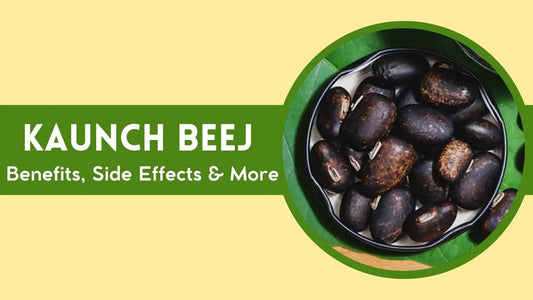
Kaunch Beej: Health Benefits, Side Effects & Uses
Kaunch Beej is widely known as velvet bean and is scientifically known as Mucuna pruriens. It is a good source of protein obtained from leguminous plants and found in the forests of the Himalayas in the lower regions.
Properties of Kaunch Beej (Mucuna pruriens)
Kaunch is an annual herbaceous vine that grows 10–12 feet long. These trifoliate leaves have oval and hairy leaflets. The pod is 5–10 cm in length, 1.2–1.8 cm broad, and contains 4–6 seeds. The flowers are purple. The oval seeds can be either black or white and are found as wild vines in all the plains of India.
Kaunch Beej Nutrition Content
Kaunch Beej is a nutrient-rich leguminous plant, known for its medicinal properties. It has been an integral part of Ayurveda for centuries. Kaunch Beej contains 55% carbohydrates and 30% proteins.
Below are nutritional content of Kaunch Beej per 100g serving:
Macronutrient Compound
-
Calories: 320-350 kcal
-
Protein: 25-30g
-
Carbohydrates: 50-55g
-
Dietary Fiber: 6-8g
-
Fats: 6-8g
Bioactive Compound
-
L-Dopa (Levodopa): 4-7g
Minerals Compound
-
Calcium: 100-150mg
-
Iron: 5-8mg
-
Magnesium: 100-150mg
-
Phosphorus: 250-300mg
-
Potassium: 1000mg
-
Zinc: 3-5mg
Vitamins
-
Vitamins: Contains Vitamin C, Vitamin E, and B-complex vitamins.
Kaunch Beej offers many benefits, including being rich in protein, and neuroprotective properties. It contains natural L-Dopa, which boosts dopamine generation and is useful in managing complications resulting from Parkinson's disease, stress, and male infertility.
Kaunch Beej In Ayurveda:
Kaunch Beej is an important herb according to Ayurveda with rejuvenating properties, which help in bringing balance among the doshas in the human body.
Traditionally, Ayurvedic practitioners have been using Kaunch Beej to treat a variety of conditions including erectile dysfunction, low sperm count, infertility, arthritis, and muscular weakness. Its adaptogenic, aphrodisiac, and neuroprotective properties enhance strength, stamina, and vitality and reduce stress. Its medicinal benefits make it a key ingredient in Ayurvedic therapies for rejuvenation and longevity.
Other names of Kaunch Beej
Kaunch Beej is known by different names in various languages:
|
Sanskrit |
Kapikacchu, Atmagupta |
|
Hindi |
Kivacc |
|
Gujarati |
Kavacha |
|
Marathi |
Khaja-Kuhali |
|
Tamil |
Amudari |
|
Telugu |
Pilli-addu |
|
Kannada |
Nasugunni |
Health Benefits of Kaunch Beej
From traditional Ayurvedic knowledge to modern science study, Kaunch Beej offers numerous health benefits including brain function, mental health, male fertility, and libido. It can help you in overall well-being and longevity naturally.
1. Boosts Brain Function and Mental Health
Kaunch Beej contains L-Dopa, a bioactive nutrient that enhances memory, focus, and learning abilities; its neuroprotective properties allow it to regenerate nerve cells and protect brain cells, further adding to mental clarity and emotional well-being.
Furthermore, it helps reduce oxidative stress and neuroinflammation, paving the way for diseases such as Alzheimer’s and Parkinson’s.
2. Supports Parkinson’s Disease Management
Kaunch Beej has been one of the topmost researched areas in benefits for the management of Parkinsonism, a neurodegenerative disease due to dopamine deficiency.
The high L-Dopa content in it serves as a natural alternative to synthetic L-Dopa (Levodopa), which is commonly prescribed for patients suffering from Parkinson's.
3. Enhances Male Fertility and Libido
In Ayurvedic medicine, Kaunch Beej is famous for enhancing sexual desire, sexual performance, pleasure and known as libido booster. It helps to increase sexual health, testosterone levels, and fertility. Its other functions include increasing sperm count, motility, and reproductive health.
Best suited for men with low sperm count, erectile dysfunction, and hormonal imbalances.
4. Regulates Blood Sugar Levels
For a diabetic individual, the potential benefits are high due to its hypoglycemic capabilities. It increases insulin sensitivity and decreases the absorption of glucose, thereby aiding in the natural control of blood sugar levels.
The fiber found in it assists in the gradual release of sugar into the bloodstream, thus preventing sudden spikes in blood glucose levels.
5. Reduces Stress and Enhances Mood
Kaunch Beej is classified as an adaptogen and aids in stress management by helping the human body cope with stress and maintain the desired level of cortisol. It acts as a pacifier for the nervous system and alleviates symptoms of anxiety, depression, and emotional lability.
The dopamine-enhancing action of the ingredient also contributes to improving mood, motivation, and energy levels.
6. Supports Muscle Growth and Strength
It is a natural, protein-replete, amino acid-based food supplement necessary for muscle development and recuperation. Further, it supports muscle protein synthesis, which makes it useful for an athlete, bodybuilders, and fitness enthusiasts.
Further, L-dopa creates motivation with enhanced stamina and energy levels, encouraging better performance in individuals while they are engaged in activities involving physical exertion.
7. Promotes Healthy Digestion
It also contains dietary fiber, which will help keep the digestive tract in good health, avoid constipation, and promote easy digestion. It aids with absorption while relieving gas and bloating.
Furthermore, the anti-inflammatory properties could help with the treatment of irritable bowel syndrome (IBS), acid reflux, and gastritis.
8. Supports Heart Health
Kaunch Beej orders around an exciting scene of activities to max the contending advance of bad cholesterol (LDL) levels and good cholesterol (HDL) levels needed for heart health while also working for the maintenance of blood pressure levels with rich potassium and magnesium.
In addition, these seeds lessen the risk of heart disease, stroke, and hypertension while regulating blood circulation and proper functioning of the heart.
9. Helps in Weight Management
It helps in controlling appetite, reducing cravings, and improving metabolism because of its high fiber and protein content. It helps you feel full and resists overeating for weight control.
This may further help combat some form of emotional eating where cravings for unhealthy foods can be controlled due to dopamine regulation.
10. Pain Healing
This includes chronic pain reduction with osteoarthritis and muscle conditions possessing inherent properties for anti-inflammatory purposes that specifically alleviate inflammation and oxidative damage at locations inflamed.
It further assists in repairing tissues and ensuring a better degree of mobility and flexibility.
11. Boosts Immunity and Overall Vitality
It strengthens the immune system with its antioxidants, vitamins, and minerals, acting protectively against invading germs, toxins in the body's environment, and even stressful conditions outside by improving the repair and regeneration of cells.
Iron and magnesium provide strength for red blood cell production, oxygen transport, and energy levels, all of which improve vitality and stamina.
Potential Side Effects of Kaunch Beej
While Kaunch Beej offers numerous health benefits, it may lead to some side effects:
-
Gastric Upset: Kaunch Beej may cause nausea, vomiting, and digestive discomfort if taken in high doses.
-
Headache: It may cause headache and fever if taken in excess.
-
Dizziness: Kaunch Beej may cause dizziness if consuming more than the recommended amount.
-
Lowered Blood Pressure: If taken in more than the prescribed dose, it may lead to hypotension in some people.
-
Allergic Reactions: People with allergic to legumes may get skin rashes or itching reaction.
How to Use Kaunch Beej
Depending on your comfort and priority, Kaunch Beej can be taken in different ways. In the market, it is commonly available as raw seeds, powder, capsules, or decoction forms.
Its powder form can be mixed with warm milk & water or tea, while capsules offer a convenient alternative. Kaunch Beej extracts are also used in several Ayurvedic formulations for medicinal purposes.
Conclusion
In general, Kaunch Beej is a medicinal Ayurvedic herb with numerous health benefits. From promoting vitality and muscle growth to improving cognitive function and fertility. It has a long history in Ayurvedic and traditional medicine, and now its therapeutic qualities are being recognized by modern science.
However, due to the high calcium content in seed, people with complications should either limit or avoid consuming kaunch beej. This can raise oxalic acid levels and cause the body to develop more kidney stones or urinary calculi.
References
Divya, B. J., Suman, B., Venkataswamy, M., & ThyagaRaju, K. (n.d.). The traditional uses and pharmacological activities of Mucuna pruriens (L)DC: A comprehensive review. Department of Biochemistry, Sri Venkateswara University, Tirupati, Andhra Pradesh, India. Retrieved from https://d1wqtxts1xzle7.cloudfront.net/51709695/170133_9172-libre.pdf
Lampariello, L. R., Cortelazzo, A., Guerranti, R., Sticozzi, C., & Valacchi, G. (2012). The magic velvet bean of Mucuna pruriens. Journal of Traditional and Complementary Medicine, 2(4), 331–339. https://doi.org/10.1016/S2225-4110(16)30119-5
Pal, A. K., Shidayaichenbi, D., Mukherjee, A., & Shubha, K. (n.d.). Velvet bean (Mucuna pruriens) seeds: Dual benefits as a nutritional source and their medicinal values. ICAR-RCER Patna. Retrieved from https://www.researchgate.net/profile/Kumari-Shubha/
Lampariello, L. R., Cortelazzo, A., Guerranti, R., Sticozzi, C., & Valacchi, G. (2012). The magic velvet bean of Mucuna pruriens. Journal of Traditional and Complementary Medicine, 2(4), 331–339. PMCID: PMC3942911. PMID: 24716148. Retrieved from https://pmc.ncbi.nlm.nih.gov/articles/PMC3942911/
Dora, B. B., & Kumar, S. (2017). Kapikacchu (Mucuna pruriens): A promising indigenous herbal drug and its effect on different disease conditions. Central Council for Research in Ayurvedic Sciences. Retrieved from
https://www.researchgate.net/publication/331113982

SAT KARTAR
Sat Kartar Limited is a trusted name in the field of Ayurveda, dedicated towards bringing you a holistic solution for your overall wellness. We have been serving people with real, natural solutions for more than 12 years. Through our educational blogs, health resources, and product innovations, we aim to empower people to embrace Ayurveda as a way of life and restore their inner balance, strength, and vitality.



